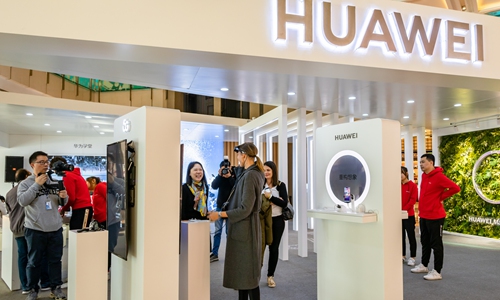HOME >> SOURCE
Huawei’s battle against US repression
By Chen Qingqing Source:Global Times Published: 2019/12/30 23:06:25

A Huawei shop in Shanghai Photo: cnsphoto
If there is only one word to define Huawei's 2019, it has to be "struggle." Struggle to survive, struggle to confront US-led suppression on a global scale, struggle to face a battle that has spread from ideology to business.
US politicians and business representatives, who usually hold a hostile view toward China, post tweets almost every day claiming the Chinese giant is a security threat.
Some firmly believe that Huawei is growing into the world's largest telecoms equipment provider because it has been stealing from the US. After US Secretary of State Mike Pompeo raised pressure over the use of Huawei in 5G roll-outs in Europe, banning Huawei or not has become a question of political correctness.
When Meng Wanzhou, chief financial officer of Huawei who is also the daughter of founder Ren Zhengfei, was arrested in Canada on December 1, 2018 over allegations of violating US sanctions against Iran, not many realized that it was a major turning point, as its low-profile founder began grabbing the microphone.
In 2019, Ren received interviews from domestic and foreign media more than 30 times, and questions related to the US were mentioned the most frequently. Ren once told us during a group interview that he is not used to being in the spotlight. The 75-year-old, who established the company in 1987, still carries the spirit of an engineer - task-driven and dedicated.
However, it's not an easy task for him to convince the critics that the company's 5G can be trusted.
Many executives inside Huawei have come up with a clear view of this matter. No matter how clear they explain the company's ownership, its relationship with the Chinese government, and its security measures, some Western officials turn a blind eye to these efforts. Some forecast that it will be a long battle with the US.
Some Huawei employees I know do not have weekends off. They travel frequently for business trips and have little time for taking care of their families. When the US put Huawei on its Entity List in mid-May and urged American firms like Google and Microsoft to cut supplies to Huawei, it became a "life or death" question, and how to endure the US war against it became a shared concern.
After a year of struggle for survival, Huawei has yet to overcome its major challenges and pass through the difficult period. Besides China, Europe is the second-largest market for the company and to secure more 5G contracts there has indeed become crucial for Huawei's long-term growth.
Some European countries, particularly the traditional allies of the US, are still hesitating to make a decision on whether to ban Huawei or not from building their 5G networks. Local representatives of Huawei have been fighting for a more fair and rational market environment immune to political debate.
Over the past year, I visited Huawei's headquarters in Shenzhen, South China's Guangdong Province, almost every month. Even during the most intense period, when the US announced it would impose restrictions on the supply of equipment and software to the Chinese firm, there was no sign that its operations and production had been affected. It has become a corporate symbol showing that Chinese companies could win the trade war initiated by the US.
RELATED ARTICLES:
Posted in: COMPANIES